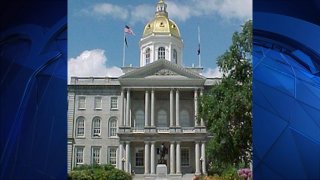
The Republican-led New Hampshire Legislature on Thursday passed a two-year state budget that includes not only $13.5 billion in spending but tax cuts, abortion restrictions and controversial education programs and policies.
When Democrats controlled both chambers two years ago, Republican Gov. Chris Sununu vetoed the budget and forced the state to operate under a temporary spending plan until a compromise was signed into law three months later. And though Republicans won control of both the House and Senate in November, that didn't ensure a smoother path this year.
Divisions among House Republicans had threatened to derail the process, with some objecting to the inclusion of Sununu's paid family and medical leave proposal and what they viewed as insufficient limits on the governor's power during a state of emergency. But in the end, the House approved the spending bill on a vote of 208-172 as well as companion legislation that includes both related and unrelated policy changes on a vote of 198-181. The Senate vote on both bills was 14-10, and Sununu is expected to sign them.
"Historic tax cuts, property tax relief and Paid Family Medical Leave delivered all in one sweeping action is a win for every citizen and family in this state," he said in a statement.
Get Boston local news, weather forecasts, lifestyle and entertainment stories to your inbox. Sign up for NBC Boston’s newsletters.
The compromise legislation approved Thursday spends about $300 million less than what Sununu proposed in February and roughly $150 million less than what the House initially approved in March. Republicans touted the budget as both fiscally responsible and responsive to the needs of the state as it emerges from the coronavirus pandemic.
"It has been a tough year for all of us. Let's give the people of New Hampshire a bright light and optimism for the future," said Rep. Laurie Sanborn, R-Bedford. "With passage of this bill we send a signal to our people and the world: New Hampshire is coming out of this pandemic stronger, more free, more affordable, more generous and more fun than ever before."
Democrats, meanwhile, argued the budget ignores the state's neediest residents while including tax cuts that will help wealthy citizens and corporations, along with $10 million to reimburse reckless investors who lost money in a Ponzi scheme. The proposal includes lowering the meals and rooms tax, reducing the business enterprise tax and increase the threshold for filing and reducing the business profits tax. It also includes the first step toward phasing out the interest and dividends tax.
Politics
"Are we stealing from the poor and giving to the rich? I think so!" said Sen. Lou D'Allesandro, D-Manchester. "Robinhood in reverse is the image that's pervasive in New Hampshire today."
Here's a look at some of the other key provisions:
ABORTION
The budget would prohibit abortions beyond 24 weeks gestation, with exceptions only to save the life of the mother. Health care providers who provide abortion after 24 weeks gestation would face felony charges that carry penalties of up to seven years in prison.
"We are only one of seven states in this country that does not put any kind of a limit on abortions," said Sen. Sharon Carson, R-Londonderry. "Forty-three states in this country have agreed that at some point you have to consider the life of the infant."
Under the bill, anyone seeking an abortion procedure would be required to have an ultrasound. Sen. Tom Sherman, D-Rye, expressed his opposition to that provision by displaying a vaginal ultrasound probe, while Rep. Marjorie Smith, D-Durham, said lawmakers should not be making such mandates.
"I am not a doctor, but I have never understood how a 424-person Legislature could fit in a doctor's office and insert themselves between doctor and patient, ordering medical procedures such as ultrasound without regard to medical necessity, patient safety or cost," she said.
EDUCATION
The budget includes the creation of voucher-like "education freedom accounts" that can be used toward private or home school expenses. It also includes much-debated provision related to education and race. An earlier version, echoing a now-rescinded Trump administration order, sought to ban discussion of "divisive concepts" in schools. The approved language, pitched as an effort to strengthen anti-discrimination laws, would prohibit teaching children that they're inferior, racist, sexist or oppressive by virtue of their race, gender or other characteristics.
Opponents said the provision robs young people of an inclusive education.
"True history, if we are honest, we can agree it was painful, harmful and worth of examination," said Rep. Latha Mangipudi, D-Nashua. "This refusal of truth is insidious because it denies the reality we see with our own eyes and experience ourselves. Living in denial of our past makes us doomed to repeat it in the future."
Rep. Safiya Wazir, who came to the U.S. as a refugee from Afghanistan, said the provision undermines "what makes America a place of freedom."
"We call ourselves the greatest country and we should allow discussion," she said.
One notable omission from the budget was Sununu's sweeping proposal to combine the state's 11 community colleges and four-year colleges and universities into one "seamless system" students. Lawmakers kept their finances separate in the budget for the next two, with the goal of revisiting the idea next year.
EMERGENCY POWERS
Under current law, the governor can declare a state of emergency and renew it every 21 days as long as he or she finds it necessary to protect public safety and welfare, though the Legislature can still vote to terminate it. That's what Sununu did when the pandemic began and continued the renewals until earlier this month.
The budget's trailer bill includes new language that would require the governor to address a joint session of the Legislature 90 days from the declaration of a state of emergency and every 90 days after that. The Legislature shall then vote on whether to terminate the state of emergency by a resolution adopted by a majority of members voting.
Associated Press Writer Kathy McCormack contributed to this report.



